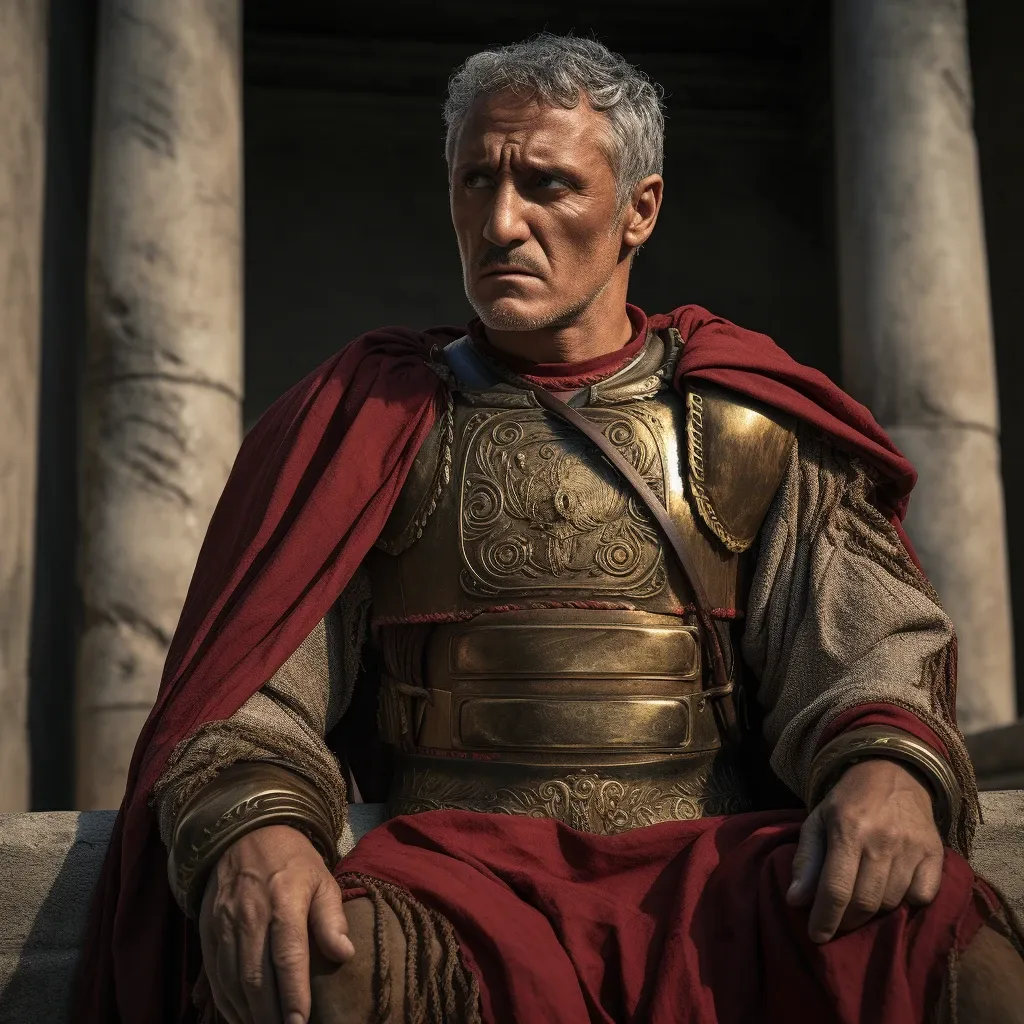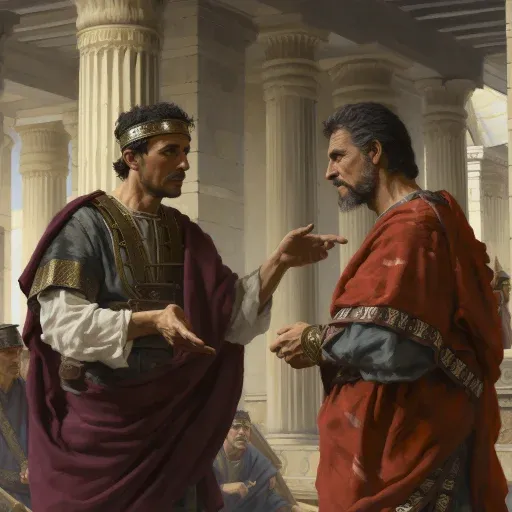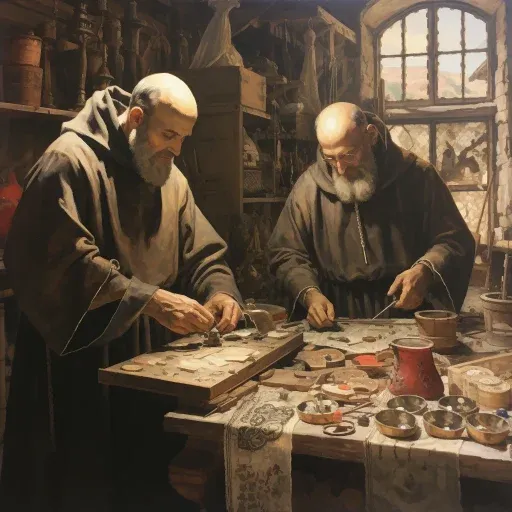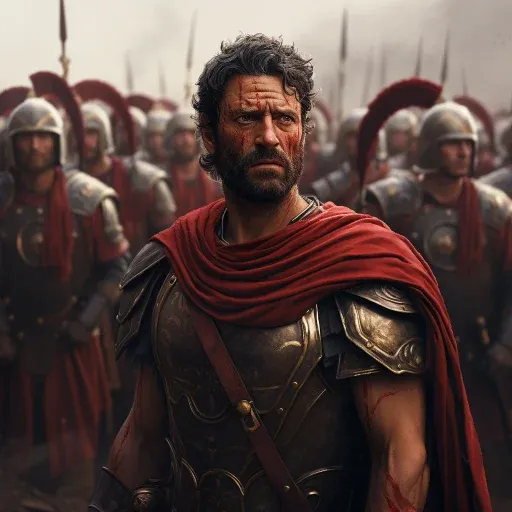BY JAMES BALDWIN
Delenda est Carthago
Famous Stories Retold: Story 26 of 30

Heading

Cato the Elder’s Phrase: The phrase "Delenda est Carthago" ("Carthage must be destroyed") was famously repeated by Cato the Elder, a Roman statesman, in every speech, emphasizing his belief that Carthage remained a threat to Rome.
Roman Dominance: The destruction of Carthage marked the end of the Punic Wars and solidified Rome's dominance over the western Mediterranean.
A good book we like, we explorers. That is our best amusement, and our best time killer
- Roald Amundsen, Explorer
Cato's Cry: The Call to Destroy Carthage
Immerse yourself in a riveting tale of ancient political maneuvering and military strategy, as we explore the echoing cry that resonated through the Roman Empire: "Delenda est Carthago!" The battle cry that rang through the streets of Rome, instigating a sense of urgency and fear among its citizens. This was not merely a declaration of war, but a call to preserve Rome's very existence, uttered by none other than Cato the Censor. As we traverse through this historical tale, you'll discover the significance of this phrase, along with the profound impact it had on the fate of two of the ancient world's greatest cities.
The Origin of "Delenda est Carthago!"
"Delenda est Carthago!"—Carthage must be destroyed! This was the rallying cry that rang out in the streets of Rome, uttered by none other than Cato the Censor, one of Rome's most respected statesmen. This phrase was not simply a statement, but a philosophy and a prophecy that Cato carried with him in his heart and preached to his fellow Romans. His conviction rested on the belief that the survival of Rome and Carthage, two powerful cities, was mutually exclusive under the same sun. The idea was not born out of malice, but out of a profound concern for the safety and future of Rome.
Cato's Early Life and Involvement in the Wars
Cato's experience as a soldier in the Punic Wars, when he was but a young man of eighteen, shaped much of his later life and beliefs. These wars, fought ruthlessly between Rome and Carthage, were a testament to the escalating tensions and the threat that Carthage posed to Rome. Cato's involvement in these wars not only hardened him but gave him a deep understanding of the enemy's capabilities. The wars were not merely historical events for him, but personal experiences that deeply ingrained in his heart the need to safeguard Rome at all costs.
Podcast
Cato's Astonishment at Carthage's Wealth and Power
Cato's first visit to Carthage as an ambassador left him in awe and fear of the city's wealth and power. The bustling harbor, filled with ships from all corners of the world, the overflowing merchandise in the shops, the magnificent public buildings, and the formidable city walls – all surpassed what Rome could boast of. This encounter with Carthage's grandeur and might caused a seismic shift in his perception. He realized that if Rome were to secure its future, it had to neutralize this potential threat. Hence was born his relentless campaign: "Delenda est Carthago!"
Cato's Influence and Public Life in Rome
Cato's influence in Rome was profound and far-reaching. As a Roman censor, he wielded considerable power, overseeing the city's morals and trying to uphold the old Roman values of simplicity and strength. His disdain for luxury and indulgence was well known, and he did not hesitate to voice his concerns.
Whenever he noticed young men, dressed in the latest fashions and idling their time away, his anger would flare up. He reproached them for their recklessness, punctuating his admonitions with his stubborn cry, "Delenda est Carthago!". Even high-ranking Roman officials were not spared from his sharp tongue. Cato scoffed at their lavish lifestyles and grand residences, uttering the same ominous warning.

Cato's Simple Life on the Sabine Farm
Returning to his farm on the Sabine, Cato lived a life of simplicity and toil. He was a man of the soil, and he found great satisfaction in the rhythm of farming life. He would discard his toga for the humble garb of a farmer, a wide-brimmed hat to shield him from the sun and a sheepskin cloak to protect him from the wind.
Cato took a hands-on approach to farming. He plowed the fields, sowed the seeds, and helped with the harvest. He fed his livestock and tended to his vineyard and olive grove. His discourses with his country neighbors revolved around farming, with discussions of wheat harvests and wine-making techniques, always ending with his signature phrase, "Delenda est Carthago!"
Cato's Last Days and Final Farewell
Cato's final days were filled with the same determination and fervor that had characterized his life. His hatred for Carthage never waned, and he used every opportunity to share his sentiments with his fellow Romans. Whether his speech was about politics, religion, or farming, he always managed to incorporate his warning about the threat posed by Carthage.
When old age finally caught up with him, Cato did not go gentle into that good night. His last words echoed the sentiments he had held steadfastly throughout his life. As he lay on his simple cot, ready to leave this world, his parting message was the same cry that had resonated through the halls of power and the fields of his farm, "Delenda est Carthago!".
Conclusion
The unwavering chant "Delenda est Carthago!" reverberated through the streets of Rome, galvanized not merely by fear, but by a compelling need to safeguard Rome's sovereignty. Cato's relentless insistence served as the clarion call that eventually led to the ruin of Carthage, securing Rome's supremacy. His life, oscillating between the power corridors of Rome and the simplicity of his Sabine farm, embodied the Roman spirit of resilience and austerity. Even in his twilight years, his cry for Carthage's destruction never waned, ultimately shaping the course of ancient history.





